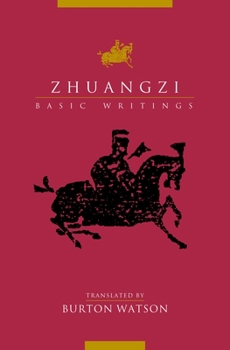Book Overview
Only by inhabiting Dao (the Way of Nature) and dwelling in its unity can humankind achieve true happiness and freedom, in both life and death. This is Daoist philosophy's central tenet, espoused by the person--or group of people--known as Zhuangzi (369?-286? BCE) in a text by the same name. To be free, individuals must discard rigid distinctions between right and wrong, and follow a course of action not motivated by gain or striving. When one ceases...
Format:Paperback
Language:English
ISBN:0231129599
ISBN13:9780231129596
Release Date:April 2003
Publisher:Columbia University Press
Length:168 Pages
Weight:0.47 lbs.
Dimensions:0.4" x 5.5" x 6.9"
Grade Range:Postsecondary and higher
Customer Reviews
3 ratings
The second classic of Taoism
Published by Thriftbooks.com User , 20 years ago
This is a very different book than the Lao Tzu. It's written in a much less poetic style, but I find Zhuangzi more readable for that reason. The style is more conversational, and well rendered into contemporary English by Burton Watson.These inner chapters contain only the core of a much longer work. Over the 2200 years since its writing, many accretions had crept into the work, including commentaries and addenda by other authors. Watson strips those away and leaves only the central and most vivid writings. Some of those may already be familiar to today's reader. For example, this book originates the man dreaming to be a butterfly dreaming to be a man. Zhuangzi offers many more of these anecdotes, too long to be analogies but too short for fables. He also calls on the history and mythology of his time - not always distinct from each other - and creates mythology of his own, whether he meant to or not.That mythology lived on in Chinese alchemy, when Zhuangzi's magical sages were taken as literal beings. Zhuangzhi lived on, too, in Taoism's eventual alignment with Buddhism. His cryptic, non sequitur style of answer seems to foreshadow the koans of the distinctly Chinese and Japanese schools of Buddhism.This is a wonderful complement to the Lao Tzu. If that book is the art of enlightenment, then this is more like the practical craft. I recommend it highly to any student of eastern classics.I must add that Zhuangzi is a more recent romanization of "Chuang Tzu" - different renderings of one name. It is easy to become confused and think that the two were different writers. It is especially confusing since Watson published this same material many years ago under the "Chuang Tzu" spelling, and now as "Zhuangzi." While I have the highest respect Burton's scholarship, I think that this difference-without-a-difference should be made more explicit.
This is a great translation
Published by Thriftbooks.com User , 26 years ago
I have have read several differant translations of this classic and by far Watson's translation is the best. His vivid translation is the closest to the origanal Chinese text. A great book!
one of the best available english translations
Published by Thriftbooks.com User , 26 years ago
The language is direct, giving some hint of the concision and grace of classical Chinese, but also retains some of the subtle humor of this profoundly subversive philosopher. Burton Watson tried to create a translation that serves both scholarly and a poetic purposes, and to a large extent his elegant work succeeeds better than any other English translation to date.





